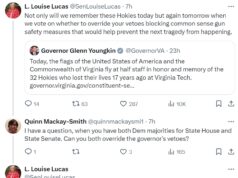( – promoted by lowkell)
 The news broke on April Fools’ Day, making Virginians feel we were the victims of a bad joke: Dominion Power announced it had bought six California solar projects, for a total capacity of 139 megawatts (MW). “This investment is another important step forward for Dominion as we expand our renewable energy portfolio,” said Dominion Chairman, President and Chief Executive Officer Thomas F. Farrell II. “These projects fit well within our portfolio of regulated and long-term contracted assets,” which also include 41 MW of solar in Georgia, Connecticut and Indiana.
The news broke on April Fools’ Day, making Virginians feel we were the victims of a bad joke: Dominion Power announced it had bought six California solar projects, for a total capacity of 139 megawatts (MW). “This investment is another important step forward for Dominion as we expand our renewable energy portfolio,” said Dominion Chairman, President and Chief Executive Officer Thomas F. Farrell II. “These projects fit well within our portfolio of regulated and long-term contracted assets,” which also include 41 MW of solar in Georgia, Connecticut and Indiana.
Don’t get excited, Virginia: this solar investor is not Dominion Virginia Power but Dominion Resources, the parent company. You can be sure executives will take every opportunity to brag about the company’s stake in the national solar market, but none of this power will reach us here in the Commonwealth.
Here, Dominion owns a grand total of one solar array at a university, all of 132 kilowatts, and a 500-kilowatt array on an industrial building. That brings the grand total to about 70 houses’ worth, if the owners don’t leave the lights on too much. Dominion is supposed to be developing a total of 30 MW of solar under a law passed in 2012, but the glacial pace of deployment is discouraging. Oh, and neither of its first two projects employed Virginia solar companies, further minimizing their impact in the state.
Why isn’t Dominion investing in Virginia? “The cost of large solar projects such as this are still too high for a regulated market in Virginia,” Dominion spokesman Dan Genest told the Richmond Times-Dispatch.
You might ask, if the costs of solar power are too high for a regulated market, perhaps it is time to deregulate the market? Somehow I don’t think that’s what Genest meant. More likely he meant that Virginia’s regulatory scheme is so skewed in favor of fossil fuels that there’s no space for utility-scale solar. Not that he would put it quite so bluntly-or admit to his employer’s role in creating this problem.
But let’s review the facts: Dominion has lavished $6.6 million over the last ten years on Virginia lawmakers, ensuring the company’s dominance in our political process. Dominion writes our energy laws and shepherds them through the legislative committees it controls. It has molded both the rules of the game and the way Virginia regulators apply them: favoring fossil fuel generation such as the expensive Wise County coal plant, ignoring costs to the public from air and water pollution, and blocking all attempts at reform.
Dominion has so shaped Virginia’s energy policy that it wouldn’t get permission from the State Corporation Commission to add a utility-scale solar project to its generation mix today. The company now finds itself a captive within the very walls it built to protect its profit and defend itself from competition, and just at a time when the world outside its walls is offering all kinds of interesting opportunities.
But there are ways out. Dominion could support a solar mandate in the General Assembly, on grounds that range from energy security to fuel diversity to preparing for a major natural disaster. Solar on gas station roofs can keep the pumps working when the electric grid fails; solar on hospitals and police stations can power essential services even when supply disruptions idle fossil-fueled generators. The more legislators understand the unique potential of solar, the easier it will be for Dominion to overcome the bias against renewable energy that it helped instill in the first place.
Or Dominion could support the value-of-solar methodology recently adopted in Minnesota that rewards solar development instead of penalizing it. Minnesota is not much known for sunshine, but its analysis of the costs and benefits of solar energy demonstrated a value for solar that exceeds even the full retail price of fossil-fired electricity. Adopting this analysis would be an about-face for Dominion; the company only recently won the right to levy punitive standby charges on some solar customers, and it has signalled a desire to impose them on the rest of the solar market as well, all on the theory that solar is of no more value than dirty power bought wholesale off the grid.
So okay, my suggestion has Tom Farrell spitting out his coffee, but bear with me. There is money to be made here.
Solar energy is no longer a marginal energy source for niche markets. Its price is going down; its market share is going up. Dominion’s own forays into solar show the company knows it has to play in this market or get left behind. So it makes more sense for Dominion to support a market in Virginia, where its influence will ensure the company profits handsomely, than to try to hold back the tide, as it is doing now. Sure, success would also mean independent rooftop solar installers would flourish in Virginia, but that’s a small price to pay for creating a whole new market in utility-scale solar that Dominion would own.
And then there’s the attraction of a carbon-free energy source in a climate-change world. A major foray into the Virginia solar market will help Dominion comply with the federal carbon rule the EPA is expected to announce in June. After all, no matter how you feel about federal rules, there are only two ways to deal with them: comply, or throw a tantrum and then comply.
It’s a fact that Dominion’s initial forays into developing solar have not inspired confidence. Dominion spends too much and takes too long to do something the private sector does better and cheaper. But Virginia has a solar industry that is champing at the bit to develop these projects and put Virginians to work in the process. Dominion may as well take advantage of other companies’ expertise here, the way it has in California.
As the saying goes: Lead, follow or get out of the way. I would settle for any one of the three. And any of them are better than what we have now in Virginia, with Dominion standing in the middle of the road, going nowhere, and blocking progress.


 Sign up for the Blue Virginia weekly newsletter
Sign up for the Blue Virginia weekly newsletter

![Tuesday News: “Johnson gambles on plan separating Israel aid from Ukraine funds”; “It Took One Day for Trump to Get in Trouble at His First Criminal Trial”; “If [Youngkin] wanted to write bills, he should have run to serve in the General Assembly”](https://bluevirginia.us/wp-content/uploads/2024/04/trumptrial-238x178.jpg)






